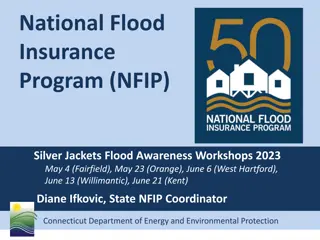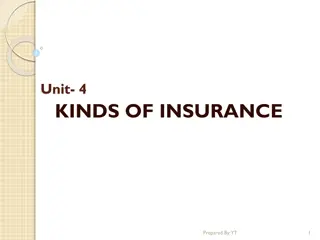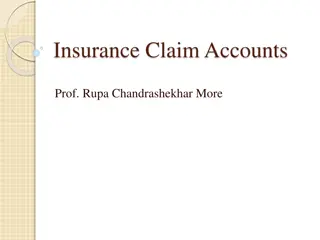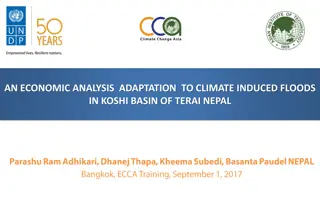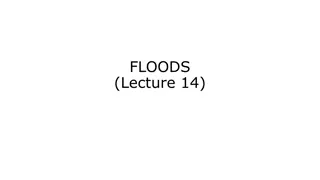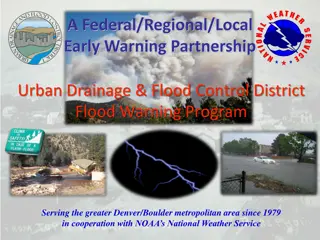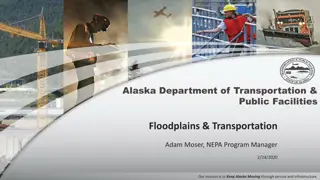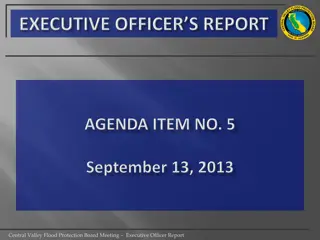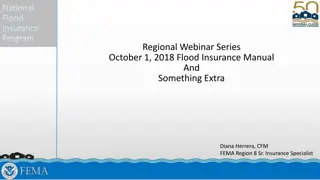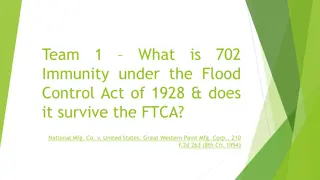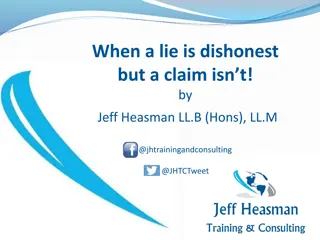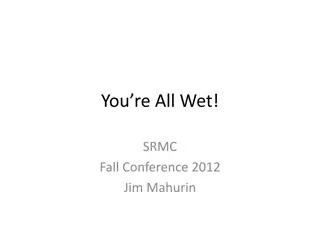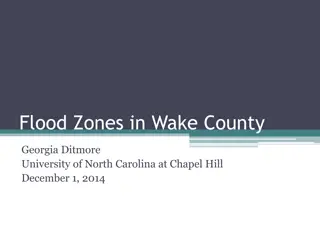Flood Definitions and Impacts on Insurance Claims
Understanding various aspects of riverine and coastal flooding, along with related politics, can shed light on the importance of FEMA flood definitions in determining insurance claim payouts. Topics include floodplain areas like floodway and flood fringe, types of buildings with insurance rates, and specific terminology like surcharge in Wisconsin. Additionally, insights into riverine flood frequencies, flood zones, and the deadliest flash floods are explored. The coastal impact is highlighted by Hurricane Katrina as the costliest natural disaster in the U.S.
Download Presentation

Please find below an Image/Link to download the presentation.
The content on the website is provided AS IS for your information and personal use only. It may not be sold, licensed, or shared on other websites without obtaining consent from the author.If you encounter any issues during the download, it is possible that the publisher has removed the file from their server.
You are allowed to download the files provided on this website for personal or commercial use, subject to the condition that they are used lawfully. All files are the property of their respective owners.
The content on the website is provided AS IS for your information and personal use only. It may not be sold, licensed, or shared on other websites without obtaining consent from the author.
E N D
Presentation Transcript
Definitions Riverine Coastal Politics Wild Card 1 1 1 1 1 1 1 1 1 1 2 2 2 2 2 2 2 2 2 2 3 3 3 3 3 3 3 3 3 3 4 4 4 4 4 4 4 4 4 4 5 5 5 5 5 5 5 5 5 5
Definitions 1 XP QUESTION: Why the FEMA definition of flood is important ANSWER: It determines whether a flood insurance claim will be paid or not
Definitions 2 XPs QUESTION: The most dangerous part of the floodplain where flow is deepest and velocities highest ANSWER: Floodway
Definitions 3 XPs QUESTION: The part of the 100-yr floodplain where development can occur without an encroachment review. ANSWER: Flood fringe
Definitions 4 XPs QUESTION: Types of buildings that have actuarial flood insurance rates ANSWER: Post-FIRM
Definitions 5 XPs QUESTION: In Wisconsin the maximum this can be is 0.00 ft. ANSWER: Surcharge
Riverine 1 XP QUESTION: In a natural, stable alluvial channel how often the stream gets out of bank ANSWER: 1.5 2 years
Riverine 2 XPs QUESTION: A name for a flood that has a 1 % chance of occurring in a given year ANSWER: 100-yr flood
Riverine 3 XPs QUESTION: Type of riverine flood that causes the most deaths. ANSWER: Flash flood
Riverine 4 XPs QUESTION: Riverine flood zone that includes the area of inundation of the 500-yr flood ANSWER: X or B
Riverine 5 XPs QUESTION: Riverine flood zone that the 100-yr flood will inundate to a depth of 1 foot or greater ANSWER: AE or A1-A30
Coastal 1 XP QUESTION: Most costly U.S. natural disaster ANSWER: Hurricane Katrina
Coastal 2 XPs QUESTION: Causes most deaths in a coastal storm ANSWER: Storm surge
Coastal 3 XPs QUESTION: Most hurricane prone state ANSWER: Florida 40 % of all U.S. landfalling hurricanes strike Florida
Coastal 4 XPs QUESTION: Three causes of exceptionally high storm surge during hurricanes and tropical storms ANSWER: Wind, low pressure, tides
Coastal 5 XPs QUESTION: Most dangerous quadrant of a north Atlantic hurricane ANSWER: Right front quadrant.
Politics 1 XP QUESTION: Forever tainted the George W. Bush administration ANSWER: Poor response to Katrina
Politics 2 XPs QUESTION: Only tropical cyclone to cause a civil war ANSWER: Great Bhola Cyclone of 1970
Politics 3 XPs QUESTION: Was the fall guy for the Federal response to Hurricane Katrina ANSWER: Michael Brown
Politics 4 XPs QUESTION: Probably lost his university job because of pressure from the Army Corps of Engineers ANSWER: Ivor Van Heerden, former Director the LSU Hurricane Center
Politics 5 XPs QUESTION: Governor of Louisiana who probably lost her job because of Katrina ANSWER: Governor Kathlene Blanco
Wild Card 1 XP QUESTION: The invert of a river channel ANSWER: Thalweg
Wild Card 2 XPs QUESTION: Ironic threat from floods ANSWER: Fire
Wild Card 3 XPs QUESTION: Act of Congress intended to make the NFIP more self- supporting ANSWER: Biggert-Waters of 2012 (BW 12)
Wild Card 4 XPs QUESTION: Most tropical cyclone-prone country ANSWER: China
Wild Card 5 XPs QUESTION: Why emergency managers recommend an axe be included in hurricane kits in New Orleans ANSWER: So you can chop through the roof to escape from the attic if flood waters get too deep






































